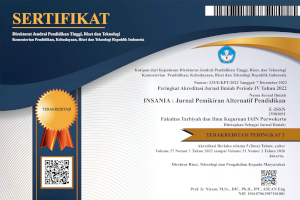Komersialisasi dan Tanggung Jawab Pendidikan: Sekelumit Pembicaraan
DOI:
https://doi.org/10.24090/insania.v13i3.305Keywords:
pragmatism, education commercialization, capitalism, BHP-BHMN, entrepreneurial university, dehumanization, awareness movement, and humanization-liberation-transcendent.Abstract
One of crucial pictures of our education recently is expensive education expense. This happen parallel with pragmatism mental on every side of social life. Commercialization and capitalism often become cause of human values destruction that actually should to be preserved by education. Therefore, we have to do awareness movement to change attitude and action of education’s actor. BHP and BHMN (State’s owner legal institution) status, that giving autonomy to education institution to raise fund from community shouldn’t accentuate commercialization of education at school or campus. Its also prevail on entrepreneurial university that its network source from global market capitalism expansion. School and campus must revitalize its public and humanity responsibility to independent, quality, creative, and responsible human. According to Kuntowijoyo, education task and responsibility is on humanizing human (humanization) effort, liberation, and spiritualizing human (transcendent). ÂDownloads
Downloads
How to Cite
Issue
Section
License
Authors who publish with this journal agree to the following terms:
Authors retain copyright and grant the journal right of first publication with the work simultaneously licensed under a Creative CommonsAttribution-ShareAlike License that allows others to share the work with an acknowledgment of the work's authorship and initial publication in this journal.
Authors are able to enter into separate, additional contractual arrangements for the non-exclusive distribution of the journal's published version of the work (e.g., post it to an institutional repository or publish it in a book), with an acknowledgment of its initial publication in this journal.
Authors are permitted and encouraged to post their work online (e.g., in institutional repositories or on their website) prior to and during the submission process, as it can lead to productive exchanges, as well as earlier and greater citation of published work (See The Effect of Open Access).








